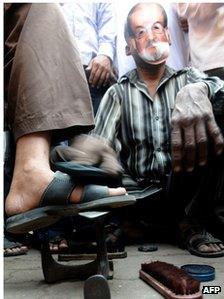Why Salman Rushdie should turn up at Jaipur festival
- Published
- comments

Muslim groups have protested against Mr Rushdie
The uncertainty over Salman Rushdie's participation in the Jaipur Literature Festival, external following protests by an Islamic seminary has a sense of déjà vu about it.
To be sure, the 64-year-old author hasn't officially called off his trip at the time of writing. The organisers say that he's not turning up on the first day of the five-day festival, but have removed his name from the list of speakers. Rajasthan Chief Minister Ashok Gehlot has made it abundantly clear he would prefer Mr Rushdie to stay away.
India swiftly banned, external Mr Rushdie's Satanic Verses in 1988 because some clerics said it had insulted Islam. (The author said he was "hurt and humiliated" by the decision.) Now Darul Uloom, a leading seminary, has kicked up a storm saying Mr Rushdie should not be allowed into the country.
Darul Uloom, external is based in Uttar Pradesh which is going to the polls next month. Several political parties have said they support the seminary's demand. None of them want to antagonise Muslims, who make up 18% of the state's voters. Hosting Mr Rushdie, many in the ruling Congress party privately believe, would hurt its prospects.
Predictably there's a Twitter storm, external over the developments.
Keeping Mr Rushdie out, says one tweet, is a "sign of an immature democracy".
There were angrier tweets aplenty. If Mr Rushdie doesn't turn up, it will be a reflection of "the slimy cowardice of the soft state bit". "This isn't a society... Not a democracy... But the biggest hypocrisy in the world !!!", screamed another. "Nothing remains untouched by politics... not even literature," tweeted an exasperated journalist.
All of this, unfortunately, appears to be true. India, say many, has become an opportunistically soft state, unwilling to make its writ run for narrow political and religious ends. Both Muslim and Hindu groups have been responsible for launching attacks on freedom of expression, with the state usually capitulating without offering any resistance, critics say. They also question whether members of these groups have actually read the works they are so quick to criticise.
India's record of protecting freedom of speech has been patchy. Hardline religious groups - sometimes supported by governments - have burnt books, vandalised paintings, threatened scholars, forced a painter into exile, and pressurised authorities to ban books and essays.
Many believe Mr Rushdie should make a point by turning up at the festival, and the organisers and book lovers should force the government to give him protection. A no-show would be another damning indictment of a country which never tires of advertising itself as the world's largest democracy. This is the time to stand up.